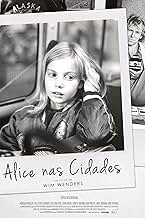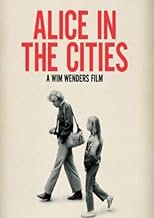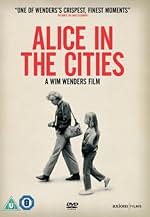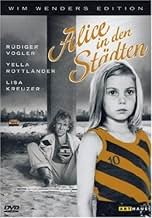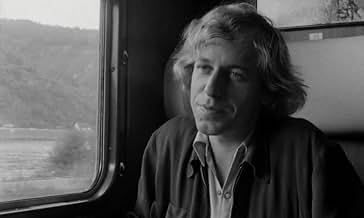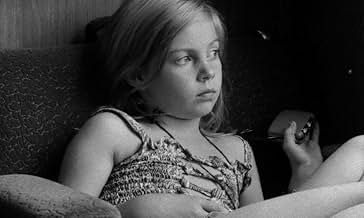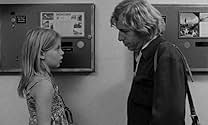अपनी भाषा में प्लॉट जोड़ेंA German journalist is saddled with a nine-year-old girl after encountering her mother at a New York airport.A German journalist is saddled with a nine-year-old girl after encountering her mother at a New York airport.A German journalist is saddled with a nine-year-old girl after encountering her mother at a New York airport.
- निर्देशक
- लेखक
- स्टार
- पुरस्कार
- 1 जीत और कुल 1 नामांकन
- Lisa van Damm
- (as Elisabeth Kreuzer)
- Young Girl on Ferry
- (बिना क्रेडिट के)
- Chuck Berry
- (आर्काइव फ़ूटेज)
- (बिना क्रेडिट के)
- Man Looking at Monitor in New York Airport
- (बिना क्रेडिट के)
- …
- Man at Chuck Berry concert
- (बिना क्रेडिट के)
- Organist at Shea Stadium
- (बिना क्रेडिट के)
- Woman Behind Philip and Alice on Plane
- (बिना क्रेडिट के)
- Man on Empire State Building Roof
- (बिना क्रेडिट के)
फ़ीचर्ड समीक्षाएं
It's very entertaining for the charm of the characters, especially Yella Rottländer as Alice. She shines here as a very self-possessed, precocious youngster who disrupts the life of the familiar, detached, angst-ridden protagonist, Philip (Rudiger Volger).
There are small details captured in this film that are noteworthy to fans as well as casual viewers. The old organ at Shea Stadium (long since removed) is briefly shown in one early scene . The monorail in Wüppertal is featured in another sequence (one of the first monorails built). There is a lot of urban decay documented in their travels, particularly in the Ruhr district scenes but all of that can't detract from the humor of the 2 lead characters' playful interactions. The shot of Philip and Alice mimicking each other doing calisthenics offsets all the dreariness and alienation in one scene. The optimistic ending is a very satisfying one. This is a beautiful gem of a film if you can find it.
"Alice in the Cities" is the first of three consecutive films by Wim Wenders about the open road, each starring Rüdiger Vogler as a similar, if not identical character. The second, "The Wrong Movement" (Falsche Bewegung) (1975), is an incredibly difficult slog of total human alienation. The third, and much better than the second film, "Kings of the Road" (Im Lauf der Zeit) (1976) is similar to this one, as Mr. Winter continues his journeys through the German countryside.
This is a film about childhood relationships - not those we have with our peers, but those of a greater age. This makes perfect sense to me, as I would without fail seek out the company of an adult over the fleeting fancies of ones closer to me. To me, anything past fully grown would blur together, all except for the very old. Philip isn't comfortable with children, just as I have become over time. It is a hallmark of those who feel that they have never outgrown their own childhood, who feel so lost inside the adult world that the past feels foreign to a present that will never fit. Their belief that living in the future is futile keeps them grounded in today, their only salvation from a life spent dreaming.
Reality is harsh in "Alice in the Cities". The release comes where life lives. The precious and precocious sensation of human interaction runs like a vein through the center of everything. This is a story suitable for anyone, not because it holds back, but because it is all in. In love with the very same world it fears, holding the hands of the same dream on whose feet it steps on. Like we all do in life. This film feels exactly like those first two or three years of your earliest memories. If you let it, you'll be taken further back than you'd have ever imagined.
A silenced bewilderment has already become routine in the completely paralyzed life of a man, who only pities himself, and who apparently has lost all access to his fellow men. Therefore the girlfriend in New York, to whom he wants to unburden all his world-weariness can do nothing for him but show him the door, saying: "Nobody told me how to live either."
So he forgot how to live, our very typical hero of modern times. But just as in a children's story rescue suddenly appears in the shape of a wondrous fairy, Philip Winters also has a surprising encounter, which will help him to determine his position in this world anew. The unexpected enlightening figure is a child, nine-year-old Alice. Her mother, whose acquaintance Philip had somehow forcibly made at the airport counter, has let her down, leaving behind a succinct message, in which she asks Winters to take provisionally charge of the girl until she will follow them to Amsterdam in a later airplane.
The mother does not appear though, and thus Philip Winters does not have any other alternative but to go on looking after the child, a responsibility he most willingly would like to avoid. But Alice remains persistent, she scents the possibility of an exciting adventure. She mentions a grandmother, who possibly lives in Wuppertal, West Germany. Unwillingly Winters bows to his fate, but after a few abortive attempts he simply deposits her at a police station and goes to a Chuck Berry concert on his own.
That could be the end of the story. But as I already mentioned, Alice is a fairy. And so she does not only come back, but also actually succeeds in getting a mechanism going in Philip Winters which seemed to be already dead and buried: the reference to the other one, the preparedness to get involved with his fellow creatures. At the end of the film he seems to be recovered, the train in which he and Alice are sitting, is obviously moving along on newly built tracks, the decisive switching of the points has been made.
At least for the time being. For it is exactly in this hopeful and promising moment that we have to leave this wonderful movie. We are just allowed to throw another brief glance at the protagonist, who is sitting in the compartment joyfully united with Alice, a moment before the camera steps back and rises into the air, moving irresistibly away from the scene, until it depicts a vast panoramic view. But our eyes are still fixed on the train that hastens steadily through the immense landscape heading towards a destiny unknown.
Between the years 1971 and 1977, Wim Wenders could do no wrong. Yet, even with his best films already on the screen, mainstream success eluded him until 1984, when his over- romanticized Paris, Texas (a fanboy-esquire ode to John Ford and the American landscape) established him as one of Cannes' most beloved filmmakers. Perhaps as a result of commercial success coming from his sappiest work to date, Wenders' chased a tangent that spiraled into career insignificance after 1993's Faraway, So Close! By the mid-late 90's, Wenders' films (documentaries excluded) became achingly pretentious and ripe for parody.
Back in his prime, 1974's Alice in the Cities / Alice in den Städten foreshadowed the near perfection to come in 1976's Kings of the Road / Im Lauf der Zeit. Overshadowed by KOTR, AITC has been overlooked, yet despite its smaller scale, budget and running time, it addresses many of the same themes common to Wenders' best films. The most prevalent of these recurring themes is: der angst (translated: Fear). All of Wenders characters are driven by a fate defined by either Kierkegaard and/or Heidegger's notion of what fear is. Wenders' Angst is the German equivalent of what Existentialism was to the French New Wave, powerful philosophical themes that would ultimately shape the direction of their respective cinematic movements.
If asked to recommend a series of films every fan of cinema should see, I wouldn't hesitate to suggest the films Wenders made between 71-77 (in addition to 1982's The State of Things / Der Stand der Dinge). In my mind these films are meditative, visually hypnotic and poignant essays that speak volumes on the human condition and of film-making itself. These films have inspired me tremendously and if you're a fan of Jim Jarmusch, discovering these films will feel like uncovering a hidden cache of his films. Jarmusch owes a great debt to Wenders both as an inspiration but also as a donor, since it was the short ends from State of Things that enabled Jarmusch to make his exceptional second feature Stranger Than Paradise. If you haven't already seen these films, make the effort...you will be happy you did: The Goalie's Anxiety at the Penalty Kick /Alice in the Cities / Wrong Move / Kings of the Road / The American Friend.
If there are movies, like comedies and horror films, that are better seen in a crowd, there are some movies that might be best seen alone. This is one of them, and I didn't realize until I was almost done because it had become so absorbing I was really enjoying my isolation within the movie.
The plot is simple, and I won't say how it happens, but a nine year old Dutch-German girl is left with a German man in the United States, and he takes care of her as they search for a way to find her mother or grandmother. Their first step is to fly back to Amsterdam, and then in Germany in a little car they poke around looking for her home.
It's a road movie, though unlike any other. The two main characters are about as perfect and as natural as it gets. The man is a thoughtful, drifting writer and photographer, an artist in the counter-culture way of the times. He has no real ambition, but observes the world with poetic appreciation. So when this girl is made part of his life, he takes it in stride. That's key to the mood of the film, that this very unlikely situation can continue for so long because he just goes with the flow. There is no running to the police, no panic. But there is no sense either that this is an accepted new relationship. It's for the moment, but the end of the moment is continually deferred.
The girl goes with the flow as well, and is as brilliant as the man at being natural in front of the camera, often doing nothing. She's made to be lovable, of course, but not in any coy or sentimental way. (If this were a Hollywood film we'd all be barfing by now.) All of this matters because it isn't what's happening that really matters, but it's just being together, the two of them, and then (you realize) the three of you. You wish it was you who was doing this utterly humane, deeply felt act of traveling and being supportive and seeing modern (1973) Germany.
The filming is simple black and white but brilliantly effective, down to the heart wrenching last shot (which was probably the most expensive). The setting is actually a surprise in that you never think of the ordinary middle class and industrial parts of middle Europe being so interesting. The music comes and goes, and refers to the earthy music of the time, mostly American blues based stuff.
In a little way this reminded me of "Stranger than Paradise" and when I connected the two I saw how much Jarmusch (in that film) owed to these art film experiments just a few years earlier. And now that I think of it, this one is more touching and important even if "Stranger than Paradise" is more inventive. "Alice in the Cities" makes a case for a kind of film we don't see being made now, and which might have another vogue one of these years in reaction to the general highly refined, highly artificial worlds of most movies today. I hope so.
क्या आपको पता है
- ट्रिवियाThe novel "Tender is the Night" by F. Scott Fitzgerald is seen on the coffee table of Phil Winter's girlfriend. A character in the novel, Rosemary Hoyt, was inspired by Fitzgerald's affair with actress Lois Moran, who appears in this film as an airport hostess. It was Moran's last movie.
- गूफ़Crew are reflected in the side of the car (at around 46 mins - sound man, microphone and other crew. This is why so many cars in movies appear dirty or have a matte paint job.).
- भाव
Lisa - Alice's Mother: What are you writing?
Philip 'Phil' Winter: The inhuman thing about American TV is not so much that they hack everything up with commercials, though that's bad enough, but in the end all programmes become commercials. Commercials for the status quo. Every image radiates the same disgusting and nauseated message. A kind of boastful contempt. Not one image leaves you in peace, they all want something from you.
- कनेक्शनFeatured in Mia toso makryni apousia (1985)
- साउंडट्रैकUnder the Boardwalk
Written by Kenny Young and Arthur Resnick
Performed by The Drifters and The Rolling Stones
टॉप पसंद
- How long is Alice in the Cities?Alexa द्वारा संचालित
विवरण
- रिलीज़ की तारीख़
- कंट्री ऑफ़ ओरिजिन
- भाषाएं
- इस रूप में भी जाना जाता है
- Alice in the Cities
- फ़िल्माने की जगहें
- उत्पादन कंपनियां
- IMDbPro पर और कंपनी क्रेडिट देखें
बॉक्स ऑफ़िस
- बजट
- DEM 5,00,000(अनुमानित)
- दुनिया भर में सकल
- $59,294
- चलने की अवधि1 घंटा 53 मिनट
- रंग
- ध्वनि मिश्रण
इस पेज में योगदान दें



